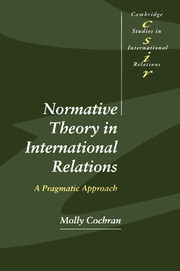Book contents
- Frontmatter
- Contents
- Acknowledgements
- Abbreviations
- Preface
- Introduction
- Part I Evaluating the impasse
- Part II Confronting the impasse
- Part III International ethics as pragmatic critique
- 6 International ethics as pragmatic critique: a pragmatic synthesis of the work of John Dewey and Richard Rorty
- 7 Facilitating moral inclusion: feminism and pragmatic critique
- 8 From moral imagination to international public spheres: the political and institutional implications of pragmatic critique
- Conclusion
- References
- Index
- CAMBRIDGE STUDIES IN INTERNATIONAL RELATIONS
7 - Facilitating moral inclusion: feminism and pragmatic critique
Published online by Cambridge University Press: 22 September 2009
- Frontmatter
- Contents
- Acknowledgements
- Abbreviations
- Preface
- Introduction
- Part I Evaluating the impasse
- Part II Confronting the impasse
- Part III International ethics as pragmatic critique
- 6 International ethics as pragmatic critique: a pragmatic synthesis of the work of John Dewey and Richard Rorty
- 7 Facilitating moral inclusion: feminism and pragmatic critique
- 8 From moral imagination to international public spheres: the political and institutional implications of pragmatic critique
- Conclusion
- References
- Index
- CAMBRIDGE STUDIES IN INTERNATIONAL RELATIONS
Summary
Introduction
In the previous chapter, I argued that a synthesis of the projects of John Dewey and Richard Rorty in an understanding of international ethics as pragmatic critique can effectively interrogate the epistemological impasse of the cosmopolitan/communitarian debate. Further, pragmatic critique shares the debate's central concern, the ‘how’ questions of moral inclusion and social reconstruction of world politics, and can offer constructive suggestions towards those goals. Now, it is the aim of this chapter and the next to demonstrate the ways in which a notion of international ethics as pragmatic critique can indeed be sufficiently political, critical and imaginative to provide for moral inclusion and social reconstruction in international practice.
To facilitate moral inclusion and social reconstruction requires that an approach not only be able to accommodate, but actually to promote, demands for justice and equality of marginalized individuals and groups in world politics. One such challenge offered from the margins of international practice is issued by women. Here, then, I will examine pragmatic critique's capacity for extending moral inclusion by examining whether it can help to further feminist ethical/political concerns. I choose to look at possibilities for facilitating feminist agendas rather than other marginalized groups in world politics – say along ethnic or racial lines – for two reasons.
- Type
- Chapter
- Information
- Normative Theory in International RelationsA Pragmatic Approach, pp. 212 - 245Publisher: Cambridge University PressPrint publication year: 1999



